Our Projects
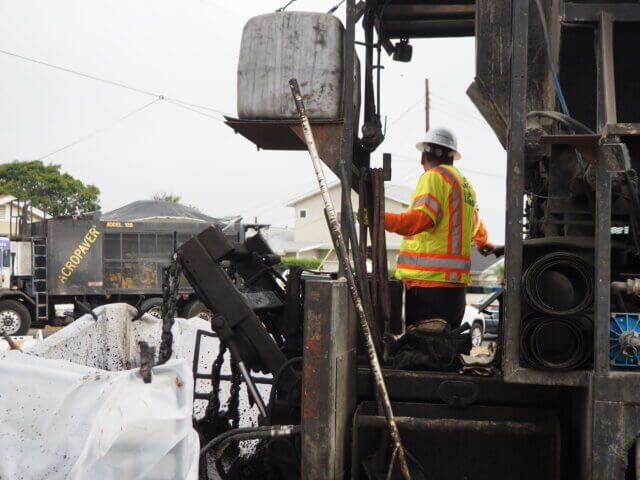
Slurry Seal – 250 Miles Completed for San Diego, CA
San Diego, CA
On July 3rd, San Diego Mayor Todd Gloria celebrated 250 miles of completed road repair consisting entirely of slurry seal performed by Pavement Coatings Co. This was a venture only made possible by combining our talents of multiple branches of Pavement Coatings Co including Southern and Northern California. There is still much more work to be done with cape seals over the chip that was placed on much of the 250 miles of slurry. An announcement by Mayor Gloria stated that he is going to be continuing his commitment to San Diego streets by funding more pavement preservation projects into 2025 via a proposed tax increase.
In attendance were San Diego City engineers, City Councilmember Stephen Wilburn, Transportation Department Director Bethany Bezak, and our PCC crew prepped and ready to lay down some more slurry.
If you would like to view the Mayor’s press conference, click here to watch (YouTube)

Route 127 Cold In-place Recycling
Caltrans utilizes Partial Depth Recycling for the sustainable pavement rehabilitation of State Route 127 near Shoshone and Death Valley National Park.
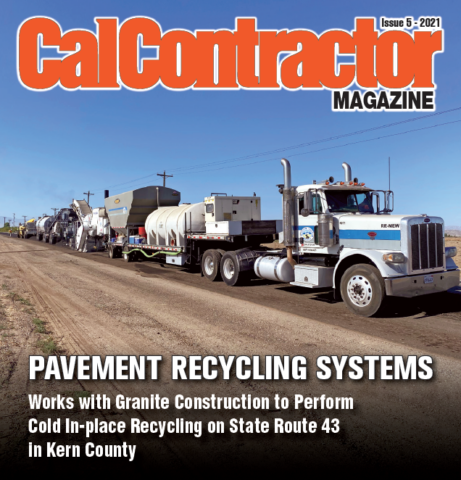
State Route 43 Cold In-Place Recycling
Kern County, CA
Senate Bill 1, the Road Repair and Accountability Act of 2017 (SB 1) was signed into law in April 2017. As of Dec. 2020, Caltrans has invested more than $8.2 billion in approximately 1,200 state highway projects. Additionally, they have spent $8.4 billion for 4,400 city and county projects within the same period. SB 1 invests approximately $5.4 billion each year to fix roads, freeways, bridges, as well as strategically investing in transit. The funds are split equally between state and local projects and will be used to fix more than17,000 lane miles of pavement, 500 bridges and 5,500 culverts on the state highway system by 2027.
Caltrans utilizes many different pavement rehabilitation methods when rehabilitating their roadways and state highway system. SB 1 references the use of “advanced technologies and material recycling techniques” to reduce costs and greenhouse emissions. Some of the powerful recycling strategies used by Caltrans to rehabilitate pavement surfaces include Full Depth Recycling (FDR), Cold Central Plant Recycling (CCPR), and Cold In-place Recycling (CIR) which Caltrans now refers to as Partial Depth Recycling (PDR). One strategy may be better suited than another, depending on the pavement engineering assessment of each project’s pavement condition and stress level.
SB 1 calls for the “use of advanced technologies and material recycling techniques that reduce the cost of maintaining and rehabilitating the streets and highways.” Allen King, P.E. is the Senior Transportation Engineer for Caltrans. “CIR (PDR) is a great way for State to decrease its carbon footprint while also realizing a substantial cost savings when compared to a mill/fill strategy with digouts,” says King.
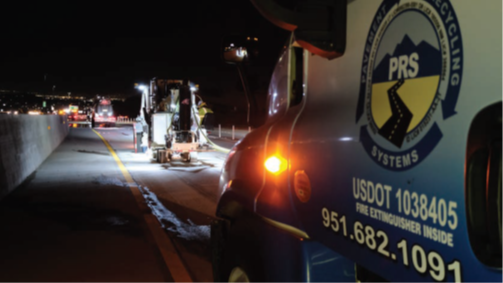
15 Freeway Profile Diamond Grinding
15 Freeway, Southern CA
Near the Pavement Recycling Systems’ headquarters there is a massive project on the north and southbound 15 freeway to add toll lanes. In March, PRS was contacted to fulfill a change order to blanket grind (as opposed to bump grinding that would only grind specific areas) the new lanes on the northbound side, as well as southbound between the Ontario Ave. exit and the 91 freeway. The total amount of profile diamond grinding was about 8 lane miles that was inertial profiled.
Using two, 4-foot grinders the end result was 8 total lane miles of smooth roadway that met CalTrans’ smoothness requirements and gave commuters a safer road that also saves them from additional wear and tear on their vehicles.

Ayala High School Cement Treatment
Chino Hills, CA
In late 2020, the Restructuring team in Jurupa Valley performed soil stabilization at Ayala High School in Chino Hills, CA who were having pumping subgrade issues at their outdoor basketball courts. Partnering with Premier Paving, the team completed over 55,000 SF of cement treat at 5% cement and 12” in depth. Overall, we helped the school district and Premier Paving save money by treating existing material rather than removing the existing non-suitable material by bringing in rock base, not to mention the numerous environmental benefits that come from treating in-place. Amazing job to everyone involved including Cody Spetz, Lawrence Reagins, Robert Almind, Joshua Guenther!

Page Mill Road Reconstruction
Palo Alto, CA
The Page Mill Road Safety Improvements project included the resurfacing and reconstruction of 11 tight switch back turns on the winding and hilly Page Mill Road that connects Palo Alto to the coast. All the construction was to improve the safety of each turn for motorists and the many bicyclists that traverse the pass each day.
PRS partnered with Teichert Construction to complete the 2” milling and overlay in multiple sections within about a 10-day window. Page Mill road, being as narrow as it is and with the tight traffic closure allowances, proved to be a logistical challenge. Jeff M. of PRS Sacramento, operated his Wirtgen 210 cold planer with care and precision through the picturesque hills, while staying out ahead of the paving crew.
“The project was pretty complicated and required me to stay on my toes and the whole team to be hyper-focused on safety. We were working long drop-offs, under the canopy of oak trees and very narrow roadways. There was a lot going on in a small space, but we were able to keep traffic flowing safely,” said Jeff, PRS Operator.
“Your milling operator onsite always stayed ahead of our paving crew and everything went real smooth. From dispatch through the end of the job, PRS helped make this a super easy and smooth project for me,” said Dan Bowen, Teichert Superintendent. PRS and Teichert were able wrap up the project, ahead of schedule and with zero safety incidents, together.

PRS SD & PCC SD – Milling & Fabric Laydown
Friars Road, San Diego, CA
PRS and PCC had the opportunity to work together with a valued and longtime customer. PRS made short work of the milling side of the project on Friars Road under the 5 Freeway with his clean and well-maintained Wirtgen 210. Next, the PCC team went to work applying PG 64-10 hot oil and Trupave fabric setting up the general contractor for successful paving operations. As one company, PRS and PCC were able to provide professional services covering multiple aspects of the same job.
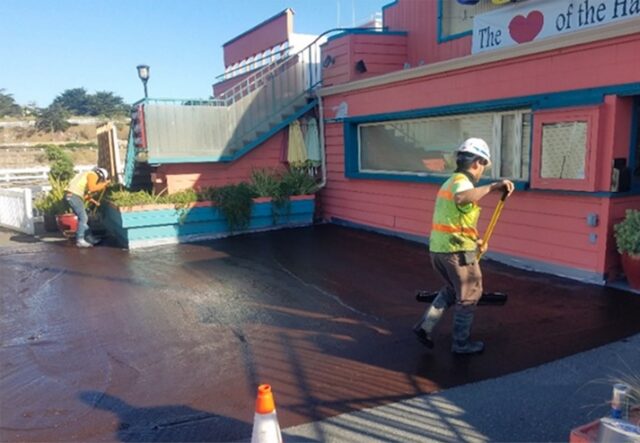
Hand-applied Slurry Seal
Wharf 1, Monterey, CA -PCC Sacramento
The City approached our Pavement Coatings Sacramento team with urgency to get this project complete before the quarantine measures were lifted in the City and the Wharf again filled with residents and tourists. From the time the City approached the team, to date of performance, the Team had five working days to pull this project together. The area where the work was to be performed was surrounded by water and small businesses/restaurants that were just beginning to open back up to the public. To make things even more challenging, the Wharf could not handle the weight of our RoadSaver Slurry Seal trucks, leading to this entire project being performed by handwork application. The crew worked together flawlessly to complete this project for the City of Monterey leaving behind a beautiful and long-lasting example of what Pavement Coatings Co. can do!

Cold In-place Recycling
Pasadena CIR – Jurupa Valley/LA Basin
We performed Cold In-place Recycling (CIR) on Orange Grove Boulevard in the city of Pasadena, the heart of Los Angeles County, CA alongside All American Asphalt who is the General Contractor and performed all the paving, installation, and compaction of the 100% recycled asphalt behind the CIR train. PRS utilized a smaller supplemental mill ahead of the CIR train which allowed a total recycle width and pave back of 16 feet wide in a single pass. The County of Los Angeles is no stranger when it comes to utilizing sustainable pavement solutions. PRS has been involved with numerous projects for and with the county over the past three decades. The county acknowledges the great work that we do and the benefits that come with it. CIR fits well into many projects for the local agencies due to very minimal lane closures and a 40:1 reduction in truck traffic. Traffic flows and stays open to the public throughout the operation, which is essential for the busy streets of Pasadena, thus a huge reduction in public inconvenience. Ara Maloyan, Director of Public Works for the City of Pasadena had this to say about the project.
“Cold In-place Recycling is setting the standard for California’s mission to be sustainable & green, and Pavement Recycling Systems is taking lead with the innovative approach. I truly believe in this technology and the environmental benefits it provides.“
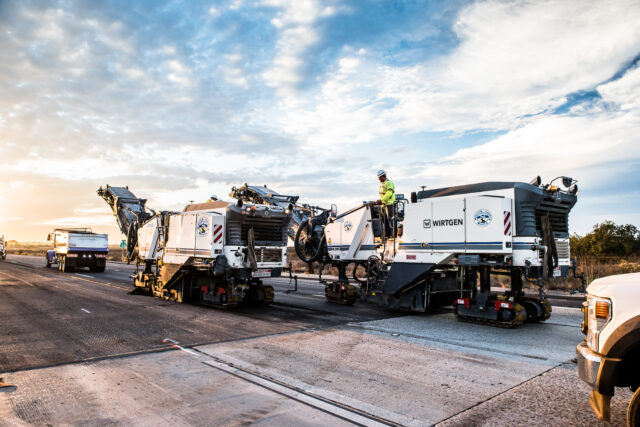
Milling & P3 Smoothness Solutions – 3D Milling, Micro Milling
Rte 52 – San Diego
The scope of this work was to repair massive settling of the roadway causing a danger to the driving public. The cause of the settlement is due to the roadway being built over an area that was once a landfill, resulting in voids under the structure of the road. It was our intent and design, working hand-in-hand with CalTrans, to utilize our P3 applications.
The first phase of this project was to correct extreme roughness to make the roadway safe for traveling public during compaction grouting by utilizing an inertial profiler and LiDAR scanner. The data was used to identify locations requiring deeper cut depths, locations with long wavelengths that the 30’ ski couldn’t correct and any cross slope or draining issues, such as, puddling in lanes. After first phase was completed utilizing the strategy with a micro mill, the roadway improved by 29%. The roadway was then paved in two lifts, first lift of .12’ HMA and second lift of .20’ RHMA. Inertial profile data was collected during paving on both lifts to ensure no corrections to first lift would be needed to meet smoothness on final surface. the smoothness achieved on final surface, large variable cuts, improvements on long wavelengths and corrections to cross slopes could not have been accomplished without the use of PRS provided design model and 3D automated machine control.
Ready?
We're here and we are ready.